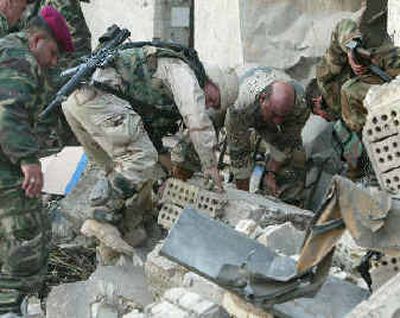New violence has some saying Iraq war worsening

BAGHDAD, Iraq – Insurgents on Tuesday assassinated the governor of Baghdad, the most senior official killed in Iraq since political authority over the country was transferred to an interim government last summer.
Insurgents also killed five U.S. troops in three separate attacks, eight Iraqi commandos and two others in a suicide bombing at a commando base in Baghdad and three Iraqi troops in a roadside bombing northeast of the capital.
“The war’s worse, the insurgency’s worse,” said a senior U.S. Embassy official in Baghdad, who spoke on condition of anonymity in order to talk candidly. “… This is not going to be a short fight. Nobody should think it is.”
The assessment reflected a new willingness among senior Iraqi and American officials to acknowledge that large tracts of the country remain beyond the control of their combined forces. More than three months ago, interim Prime Minister Ayad Allawi asserted during a visit to Washington that 15 of Iraq’s 18 provinces were stable and largely peaceful. Now, in interviews, he routinely refers to the situation here as “our catastrophe.”
Iraq’s Shiite Muslim-populated south and sections of the north populated by ethnic Kurds are stable and relatively secure. Their inhabitants are looking forward to elections scheduled for Jan. 30 that will give them significant power in Baghdad after decades of repression.
But daily spasms of violence persist in Iraq’s midsection. Iraqi and U.S. officials acknowledge that attacks have become routine in the six central and northern provinces where Sunni Muslims – the once-dominant minority whose power evaporated with the fall of Saddam Hussein – reside in large numbers. Including Baghdad, the six provinces account for half of Iraq’s territory and at least half of its 25 million people.
Iraq’s interim president, Ghazi al-Yawer, told the Reuters news agency Tuesday that the United Nations should “stand up for their responsibilities and obligations” by assessing whether the election can be conducted on schedule. “On a logical basis, there are signs that it will be a tough call to hold the election,” al-Yawer said in a rare departure from official assurances that the date of the vote remains firm.
Instability remains the worst in the region north and west of the capital known as the Sunni Triangle. A Marine was killed Tuesday in Anbar province, west of Baghdad, and a roadside bomb killed a soldier with the U.S. Army’s 1st Infantry Division near Balad, 50 miles north of Baghdad.
In far northern Nineveh province, where, as in Anbar, insecurity forced cancellation of voter registration last month, U.S. commanders this week doubled the force struggling to control Mosul. Officials, including Allawi, have hinted that an offensive on Iraq’s third largest city is in the offing.
“We’re going to do better in Mosul,” one Western diplomat said.
At the same time, armored battalions of the 1st Cavalry Division last week rolled in to the grimy towns south of Baghdad in an area of north Babil province that, last year, became so dangerous to travelers that Iraqis began to call it the “triangle of death.”
New flash points glimmer on the horizon.
Richard Armitage, the deputy secretary of state, in recent days joined a flurry of U.S. officials scrambling to dissuade Kurdish parties from sitting out the portion of the election that will seat a provincial council in Kirkuk, the oil-rich city claimed by Kurds, ethnic Turkmen and Arabs. On Tuesday, U.S. and Iraqi officials were attempting to hold together a compromise slate of candidates that would delay a showdown for the northern city by preserving a provisional status quo put in place by the U.S.-led occupation authority.
“Kurdish participation is assured and guaranteed,” the Iraqi Foreign Minister Hoshyar Zebari, a Kurd, promised at a news conference Tuesday.
The death toll in attacks around Iraq on Tuesday reflected the targets most frequently chosen by insurgents in the run-up to elections scheduled for Jan. 30: Iraqi civilians prominent in the U.S.-installed interim government, American troops regarded by many Iraqis as an occupying force and, most of all, the freshly trained Iraqi armed forces being groomed to take responsibility for security in their country.
Baghdad’s governor, Ali al-Haidari, was killed by insurgents who swarmed over his convoy from several directions in one of the capital’s poorest neighborhoods. Six bodyguards were killed with him. Al-Haidari was a serious, meticulous man who rose from being an air conditioning repair merchant to the capital’s top position through neighborhood, district and city councils established after the fall of Saddam.
Al-Haidari’s assassination came hours after a yellow fuel truck exploded at the entrance to an Iraqi commando base near the city center. The gigantic blast damaged 40 homes and destroyed 15 cars. Parents ran to the nearby Husari primary school to gather their children, whose screams filled the air.
“I still don’t know how I survived,” said Ziyad Ghali, 34, who was driving to a bakery to buy bread for breakfast at the time of the attack. “I cannot forget the sound of the explosion.”
Afterward, fresh blood stained the walls and shrapnel from the massive tanker lay everywhere. The mood of the neighborhood swung between anger and depression.
“This was not the first time this place was attacked, but it was the biggest one,” Wasfi Hiti said outside his shattered house. “We are really pessimistic. We think there will be more and more destruction.”
Al Qaeda in Iraq, the group headed by Abu Musab al-Zarqawi, a Jordanian, claimed responsibility for both attacks in separate Internet postings. Also in Baghdad, a massive roadside bomb killed three American soldiers and wounded two at 11 a.m., the military said. Names were withheld pending notification of next of kin.